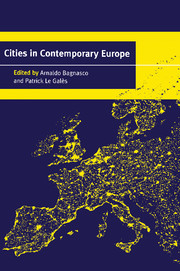Book contents
- Frontmatter
- Contents
- List of figures
- List of tables
- List of contributors
- Preface
- Introduction: European cities: local societies and collective actors?
- 1 European cities in the world economy
- 2 Spatial images of European urbanisation
- 3 Segregation, class and politics in large cities
- 4 Social structures in medium-sized cities compared
- 5 Different cities in different welfare states
- 6 Social movements in European cities: transitions from the 1970s to the 1990s
- 7 The construction of urban services models
- 8 Private-sector interests and urban governance
- References
- Index
6 - Social movements in European cities: transitions from the 1970s to the 1990s
Published online by Cambridge University Press: 12 October 2009
- Frontmatter
- Contents
- List of figures
- List of tables
- List of contributors
- Preface
- Introduction: European cities: local societies and collective actors?
- 1 European cities in the world economy
- 2 Spatial images of European urbanisation
- 3 Segregation, class and politics in large cities
- 4 Social structures in medium-sized cities compared
- 5 Different cities in different welfare states
- 6 Social movements in European cities: transitions from the 1970s to the 1990s
- 7 The construction of urban services models
- 8 Private-sector interests and urban governance
- References
- Index
Summary
Urban social movements reveal that cities are not unified political actors: their protest activities and the demands which they insert into the political arena reveal cleavages and conflicts within the local space that have consequences for how cities may act on the larger stage.
This chapter looks at how urban social movements have developed over the past few decades in order to assess their current shape and significance for European cities. It interprets the movements in the context of structural trends, which have taken somewhat different forms in the different European countries as well as different forms in various types of cities. Depending on the differing degrees of modernisation, of centralisation and of decentralisation, the strength or weakness of political parties able to absorb and process the disruption and conflict, and the openness or repressiveness of the given political opportunity structure, outcomes in the different countries may range from intense movement mobilisation and interest group activity to no extra-parliamentarian activity at all. More detailed country-specific analysis is necessary to explain such varying patterns, and to analyse the role movements are playing in the formation of cities as political actors. This chapter is but a first step in capturing some significant shifts in the make-up and role of urban social movements from the 1970s and early 1980s, when these movements exhibited relative coherence and unity in their opposition to urban renewal, in their demands for improved collective consumption, and in their challenge of the established parties' and local governments' monopoly to process political interests (cf. Castells 1973; Ceccarelli 1982), to the 1990s, which have seen an extremely fragmented urban social movement scene all over Europe.
- Type
- Chapter
- Information
- Cities in Contemporary Europe , pp. 131 - 152Publisher: Cambridge University PressPrint publication year: 2000
- 32
- Cited by



